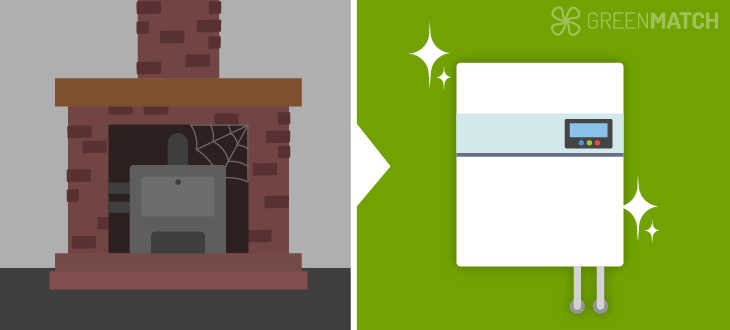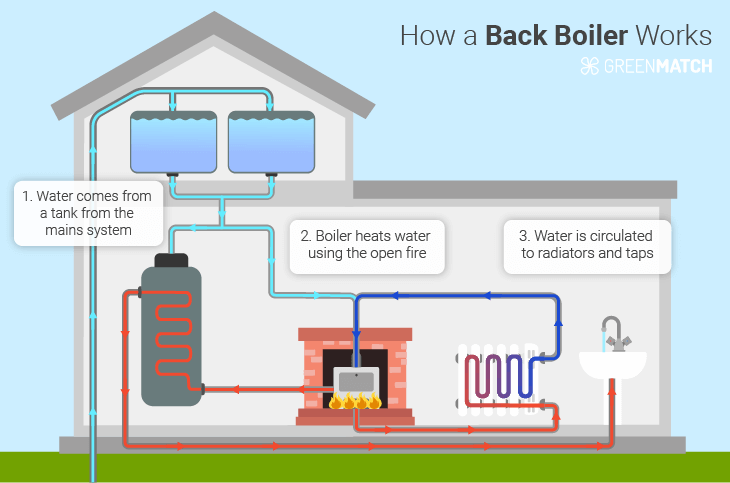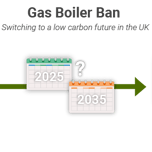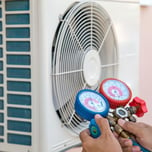Answer these simple questions and we will find you the BEST prices
Which type of solar quotes do you need?
It only takes 30 seconds
100% free with no obligation

Get up to 3 quotes by filling in only 1 quick form

Slash your energy bills by installing an energy efficient boiler

We’ve helped over 500,000 homeowners reduce their carbon footprint
- GreenMatch
- Blog
- Back Boiler
Back Boiler Replacement: Is it Worth it?

While back boilers haven’t been installed in houses in the UK since 2005, you may still have an old back boiler that you’re looking to replace. Back boiler replacements are common because of the benefits you receive from switching to modern condensing boilers. Read on to find out what a back boiler is and why back boiler replacement is a valuable investment.

What is a Back Boiler?
Back boiler units (BBU), also called solid fuel back boilers or gas back boilers, are an older type of boiler that was used in the 1960s, 70s, and 80s. They get their name from the fact that they are mounted as a back boiler fireplace or a back boiler stove and use the heat from the fire to provide central heating and domestic hot water. They were popular because of their compactness and ability to be hidden.
Because they are considered outdated and inefficient when compared to modern heating systems, a back boiler added to an open fire is something you can expect to only find in very few older homes. If you still own an open fire back boiler in your home, you should know that they are rarely manufactured in favour of modern boilers. Also, since the 2005 Building Regulations, installing a back boiler is illegal in the UK.
The Building Regulations state that newly installed boilers must have at least 86% boiler efficiency. For reference, a modern condensing boiler usually has 92-94% energy efficiency while an old back boiler usually only goes up to 70%.
Because of this, back boiler fire systems are commonly replaced by condensing boilers or renewable energy heating systems. Not only are modern boilers significantly more energy efficient, but they are also built safer due to updated regulations.
Do you have a back boiler that you want to upgrade to be more efficient and safer? Replacing your old back boiler doesn’t need to involve time-consuming phone calls to local installers. It can be as easy as instantly receiving up to 3 free quotes that you can choose from.
It takes less than a minute to answer some key questions about your heating needs to get quality quotes that you can use with no obligation. To get started, simply click the button below.
- Quotes from local engineers
- Payment by finance available
- Save up to £975
It only takes 30 seconds



How Does a Back Boiler Work: Explained By Diagram
Gas fire back boilers operate by using the heat generated from the open fire in the fireplace or stove to heat water for your central heating and hot water use. Upgrading a wood burner or an open fire with a back boiler will provide you with heat for your central heating system and domestic hot water.
The boiler itself sits behind a fireplace or stove and is connected to a hot water cylinder. The whole system is supplied with mains water fed through a cold water tank, usually found in the loft. That water is heated up by the back boiler and is then stored in the hot water cylinder, usually found in a downstairs cupboard, to be sent to your taps and shower. The boiler will also heat water to send around the radiators.
The back boiler diagram below shows how a back boiler fire works.

5 Reasons Why You Should Replace Your Back Boiler
Nowadays, back boilers really only have one upside: their compact size. The fact that a back boiler is cheaper is overshadowed by its more expensive running costs and difficulty to repair. In other words, a replacement back boiler is not really recommended, especially considering the wide range of condensing boilers and low-carbon heating systems available on the market.
With this being said, there are also more reasons why you should replace your back boiler. Below are the top 5 reasons.
- Back boilers are significantly less energy efficient than modern condensing boilers and can waste up to £630 every year on energy bills.
- Inefficient back boilers have been illegal to install since 2005 due to high carbon emissions and government safety regulations.
- Repairing back boilers is difficult and expensive due to very few companies producing back boilers or replacement parts.
- Old back boilers are more prone to safety issues than modern condensing boilers with some cases of back boiler-related explosions.
- Back boilers have expensive running costs that waste 30p per £1 you spend on energy.
What To Do With Your Old Back Boiler in the UK?
If you would like to replace your boiler because it’s either broken or old, the best choice is to call a Gas Safe registered engineer. They can also help you choose the best new boiler for your home. With a boiler upgrade, you'll notice considerable energy cost reductions and quicker hot water.
You have 4 options when replacing your old back boiler with a new boiler. You can choose to either install a combi boiler, system boiler, regular boiler, or a low-carbon system. The type of system you upgrade to depends on factors such as your heating demands and budget.
The following 4 options all have more than 90% energy efficiency, making them a more than ideal replacement for your back boiler.
Replace Back Boiler With A Combi Boiler
Removing your back boiler and replacing it with a combi boiler is ideal if you have a small to medium-sized home. Combi boilers are a popular boiler type because they’re able to heat hot water on demand and central heating from the same unit without needing an additional tank. As a result, they usually aren’t powerful enough to heat large homes with high hot water and heating demands.
Replace Back Boiler with a System Boiler
If you have a larger home with two or more bathrooms, then you should consider replacing your back boiler with a system boiler. System boilers can meet higher water demands as they source water from the mains supply to heat the central heating and hot water to store in a hot water storage tank. This means there is more hot water available on demand.
Replace Back Boiler with a Regular Boiler
Regular boilers are also an option as a back boiler fire replacement for homes with multiple bathrooms and high demand for heating and hot water. Regular boilers require a tank in the loft to supply cold water and a large hot water storage tank to store the heated water for your taps.
Replace Back Boiler with a Low-Carbon System
If you’re looking for a back boiler replacement that is more environmentally friendly, you should consider low-carbon heating systems such as heat pumps, solar panels, or electric boilers.
These gas boiler alternatives help you to reduce your home’s carbon emissions and save on annual energy bills because of the increased efficiency. For instance, you could be achieving energy efficiencies between 300% to 500% with a ground source heat pump. That means they produce 3 to 5 times more energy than they use!
A biomass boiler would be another viable alternative to a log burner with back boiler or wood burner with back boiler. They are considered carbon-neutral heating options and, therefore, can benefit from government biomass boiler grants.
While the environmental and economic benefits of low-carbon heating systems are clear, they are also a financial investment that might not be available to you right now. But the good news is that, in the meantime, you can still continue your journey to decarbonise your home. For example, electric combi boilers are a good starting point towards being more environmentally friendly while saving up money for a fully renewable energy system.
You can get a head start on saving money by comparing the prices of new boilers and low-carbon heating systems from different installers. Doing this helps to ensure that you’re getting the best deal available.
We help you save time and effort on finding up to 3 of these quotes with our wide and reliable network of installers. You won’t need to spend time calling all of your local installers for prices. Instead, you just need to answer some questions about your heating demands so that we can provide you with free quality quotes with no obligation. Click the button below to get started.
- Quotes from local engineers
- Payment by finance available
- Save up to £975
It only takes 30 seconds



Back Boiler Replacement Costs
Your back boiler replacement costs depend on two main factors: the cost of removing a back boiler and the cost of the new system you’re upgrading to. Generally, you can expect to pay at least £3,000 in total for the back boiler removal and replacement with a combi boiler.
When replacing your old back boiler, you can also ask your installer to decommission it instead of removing it. Decommissioning a boiler effectively means it will be disconnected from the gas source and power. Having your back boiler decommissioned could potentially save you up to £1,000 because it saves on the additional cost of removing a back boiler and opening up a fireplace.
There are more considerations related to the installation of a new system that you also need to take into account:
- Re-piping system to a new location
- Additional components (e.g. hot water cylinder, cold water tank)
- Restoration costs if you remove or decommission back boiler
- Cost of new heating system
Are There Back Boiler Removal Grants?
Whilst there are no direct back boiler removal grants, you could be eligible for a grant to update your entire heating system. Generally, these grants are green energy grants for homes looking to upgrade their heating system from a carbon-intensive heating system to one that is more eco-friendly. Each grant scheme has its own eligibility criteria. With a back boiler, you could be eligible for the ECO4 scheme or the Boiler Upgrade Scheme.
Get Quotes For A Back Boiler Removal And Replacement
The upfront cost to replace a back boiler heating system can be expensive, but it is generally the best long-term heating decision for your home because you’re able to save hundreds of pounds each year on your heating bill.
The key to maximising these savings is by finding a Gas Safe registered installer that’s able to offer a competitive price. Rather than spending an endless amount of time finding and comparing the prices of local installers in your area, GreenMatch can quicken this process for you by instantly providing you with 3 competitive quotes for back boiler replacement.
If you would like to receive free quotes for back boiler replacement costs, you’ll just need to answer some questions about your heating demands so that we can recommend quality installers to help with your back boiler replacement. Click the button below to get started.
- Quotes from local engineers
- Payment by finance available
- Save up to £975
It only takes 30 seconds



FAQ
Old back boilers have not been legal to install since Building Regulations were changed in 2005. They were banned because of their low energy efficiency and safety concerns, especially when compared to modern heating options. Common back boiler replacement options include condensing boilers and low-carbon heating systems.
Getting a new back boiler is not worth it. This is because back boilers are generally seen as outdated and inefficient heating systems. However, removing and replacing a back boiler with a new boiler is commonly done and is worth it in the long term.
Old back boilers were banned in 2005 when the Building Regulations changed and required boilers to operate at higher efficiencies. Since then, more boiler manufacturers have discontinued their back boiler models to focus on more efficient condensing boilers.
A back boiler provides hot water and central heating to your home. A simplified explanation of how a back boiler works is by taking the heat from an open fire in a fireplace and using it to heat water that’s distributed as domestic hot water and for central heating.
Yes, there are many reasons why you should replace your back boiler, but one of the most significant reasons is its expensive running costs. For every £1 you spend on heating with a back boiler 30p of that is wasted due to lost heat.

As a writer with a deep understanding of low-carbon energy systems, Hannah aims to breakdown knowledge barriers and share insights to empower individuals in their pursuit of creating more environmentally conscious homes.
We strive to connect our customers with the right product and supplier. Would you like to be part of GreenMatch?





